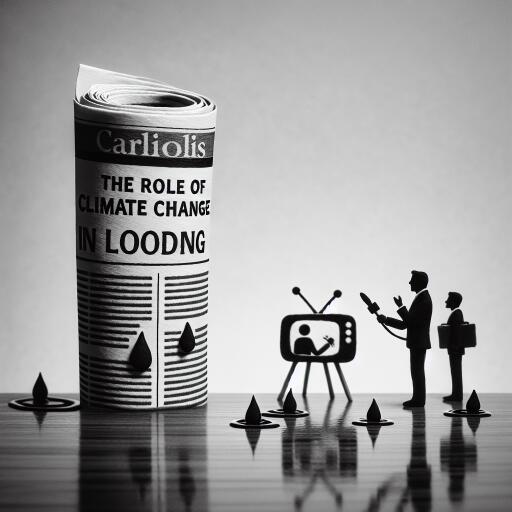
LETTER: Media neglects climate change’s role in flooding
In the echoes of childhood tales, we learned of the Big Bad Wolf, whose mighty huff could topple houses built on shaky foundations. This imagery paints a vivid picture of our current environmental crisis, yet it seems the media has turned a blind eye to the underlying forces at play. The modern-day wolf, climate change, exacerbated by the relentless burning of fossil fuels, is huffing more fiercely than ever, threatening to bring our societal structures crashing down with increased natural disasters.
Recent flooding across Siouxland and regions beyond has captured headlines, drawing much-needed attention to the immediate impacts of these catastrophes. However, the coverage often skirts around the critical issue fueling these disasters: the undeniable role of climate change. It is disheartening to see such limited discourse on the warming world’s contribution to extreme weather events, leaving a gap in our understanding and response to these crises.
The core issue lies in the emissions of greenhouse gases from fossil fuels, which trap heat in our atmosphere. This correlation is not a new discovery. Major publications like the New York Times have highlighted the direct link between carbon pollution and a surge in extreme weather patterns, including droughts, wildfires, floods, and record-breaking heatwaves. Despite this knowledge, there remains a staggering lack of focus on climate change within news coverage on these events. The absence of dialogue about carbon emissions’ role suggests a missed opportunity to inform the public about the root causes of these increasing disasters.
Further analysis reveals a concerning trend in the coverage of climate-related news. A climate-focused newsletter, Heated, scrutinized numerous national and international news articles regarding breaking news and found a dismaying oversight in reporting. A mere 11 percent of these articles made any mention of fossil fuels, the predominant source of the carbon emissions driving climate change. Even more concerning was the limited discussion on other contributing factors such as deforestation and animal agriculture, with almost no articles addressing these critical issues.
This oversight prompts us to question whether current news practices are inadvertently fostering a widespread misunderstanding of climate change. Surveys indicate that only a fraction of the population comprehends that human activities, particularly the burning of fossil fuels, are the primary drivers behind the accelerating changes to our climate. This gap in understanding underscores the urgent need for more comprehensive coverage of the climate crisis, incorporating the scientific basis and the multifaceted impacts on our planet.
It’s time we confront the Big Bad Wolf at our door. The media has a pivotal role in shaping public perception and awareness, and it must rise to the challenge by providing thorough, insightful reporting on the climate crisis. As extreme weather becomes the new norm, the stakes could not be higher. We owe it to future generations to lay bare the truth about climate change, ensuring that our responses are informed, decisive, and aimed at securing a sustainable future for all.
Our survival and the preservation of our planet require nothing less than a bold reimagining of our relationship with the environment and a critical evaluation of the narratives we choose to amplify. Let’s demand more from our media. Let’s demand the full story.





Leave a Reply